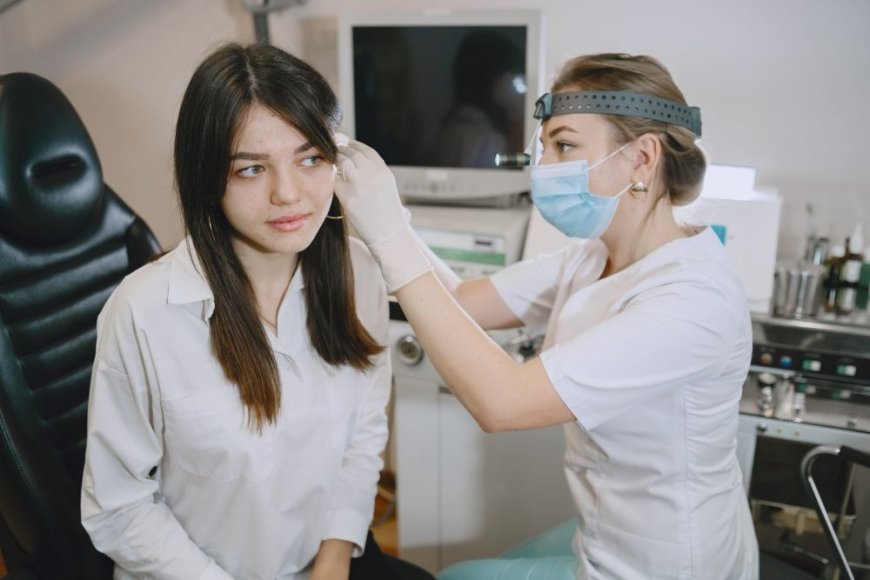How Clinics Handle Ear Pain That Comes On Suddenly
Before you search for Ear Infection Urgent Care, read on to learn how skilled teams assess, diagnose, and treat sudden ear aches — and why so many choose Urgent Care Downtown Chicago when they need help quick.

Nothing feels worse than a sudden sharp pain in your ear. It can make you stop in your tracks, distract you from work, or keep you from sleeping. But clinics across the city know how to manage that pain fast and get you back to feeling like yourself.
Before you search for Ear Infection Urgent Care, read on to learn how skilled teams assess, diagnose, and treat sudden ear aches — and why so many choose Urgent Care Downtown Chicago when they need help quick.
Why Sudden Ear Pain Happens
When your ear starts hurting out of nowhere, it’s usually caused by one of three things:
Fluid Buildup Behind the Eardrum
Your middle ear is a small space behind the eardrum. If fluid gets trapped after a cold or allergy flare‑up, pressure builds and you feel pain. This fluid also acts like a perfect breeding ground for bacteria.
External Ear Canal Problems
Sometimes the outer ear canal gets infected. That’s called swimmer’s ear, but it can happen even if you’ve never been in a pool. Constant moisture or small cuts let germs in, leading to swelling and pain.
Referred Pain From Nearby Areas
Jaw issues, sinus infections, or dental problems can trigger sharp jolts in your ear. It’s surprising, but our nerves are deeply connected.
When to Seek Immediate Care
Not all ear pain needs a trip to the clinic. But these signs mean you should head straight for Ear Infection Urgent Care:
-
Severe pain that won’t ease with over‑the‑counter medicine.
-
High fever alongside ear discomfort.
-
Hearing loss or a feeling of fullness in the ear.
-
Discharge of fluid or blood from the ear canal.
-
Swelling around the ear or jaw.
If you spot any of the above, waiting it out can make things worse. Clinics that specialize in Ear Infection Urgent Care are open late and on weekends, so you never have to worry about missing hours.

First Steps at the Clinic
When you walk into a clinic like Urgent Care Downtown Chicago, here’s what usually happens:
Triage and History
The front‑desk team asks you questions like how long the pain has lasted and if you have any other symptoms. This helps nurses quickly figure out if your case is urgent.
Physical Exam
A provider uses an otoscope — a lighted tool — to look inside your ear. They check for:
-
Redness or swelling in the canal
-
Fluid or wax blocking the view
-
Signs that the eardrum is bulging or perforated
This inspection takes only a minute or two, but it tells the doctor a lot.
Diagnostic Tests to Pinpoint the Cause
Most cases are clear from the exam, but sometimes clinics use extra tests:
Tympanometry
This simple test measures eardrum movement. If the eardrum doesn’t move normally, fluid might be hiding behind it.
Hearing Screen
A quick hearing test ensures your hearing hasn’t been affected. If there’s a drop in certain tones, that can guide treatment.
Lab Samples
If fluid is draining from the ear, a small sample may be sent to a lab. This helps identify the exact germ causing the infection.
Treatment Options on the Spot
Once the cause is clear, your provider tailors a plan right away:
Ear Drops and Antibiotics
For outer‑ear infections, medicated drops clear infection and reduce swelling. If it’s a middle ear infection, you may get oral antibiotics.
Pain Control
Clinics often give you a prescription or recommendation for pain relief, including:
-
Over‑the‑counter acetaminophen or ibuprofen
-
Prescription‑strength options if needed
-
Warm compress instructions for soothing pain
Ear Cleaning
If wax or debris is causing pain or blocking medicine, staff gently flush or suction the ear canal. This cleaning not only relieves pressure but also helps treatment work better.
Follow‑Up and Home Care
Treating the immediate crisis is just step one. Good clinics ensure you heal fully.
Follow‑Up Visits
They may ask you to come back in a few days if your pain or drainage doesn’t improve. This lets them check for complications early.
Self‑Care at Home
Simple tips include:
-
Keep your ear dry while showering (cotton with petroleum jelly helps).
-
Finish all antibiotics, even if you feel better.
-
Avoid inserting cotton swabs or fingers in your ear.
Prevention Tips
Once you’re better, ask about preventing future ear issues. Clinics often suggest:
-
Allergy management through medication or lifestyle changes
-
Earplugs for swimming and bathing
-
Treating colds early to avoid fluid buildup
Why Choose Specialized Clinics?
When you need fast relief for ear pain, not all facilities are the same. Clinics offering Ear Infection Urgent Care focus on ear‑related issues and have:
-
Staff trained in ear anatomy and infections
-
Equipment like microscopes and flexible scopes for detailed exams
-
On‑site lab capabilities for quick tests
And if you live or work near the city center, you’ll find some of the best options at Urgent Care Downtown Chicago. Their location and hours make them a top choice for busy people.

FAQs About Sudden Ear Pain
Q: Can ear pain go away on its own?
A: Mild cases sometimes improve in a couple of days, but if pain is severe or persists beyond 48 hours, get checked.
Q: Are antibiotics always needed?
A: Not always. For outer‑ear infections, drops may suffice. Middle‑ear infections sometimes clear with watchful waiting, unless symptoms worsen.
Q: Is it safe to swim after an ear infection?
A: After treatment, wait until your provider says the ear canal is fully healed. They may suggest special earplugs for water activities.
Real Patient Stories
“I woke up with a sudden stabbing pain in my left ear. I thought I’d need to wait for my doctor, but the clinic had evening hours. They quickly diagnosed me and the drops they gave me worked within days.” — Sarah, 34
“Last month my son had ear pain after swimming. We drove to the clinic, and they cleaned his ear right away. No one wants to see their kid in pain — glad we got help fast.” — Mark, 42
Stories like these show why specialized clinics make a difference.
Conclusion
Sudden ear pain can be scary, but you don’t have to suffer in silence. Clinics that specialize in Ear Infection Urgent Care are equipped to evaluate, diagnose, and treat you quickly. With skilled staff, the right tools, and easy follow‑up, you’ll be back to normal soon.
If you need fast, expert care, consider visiting Urgent Care Downtown Chicago — they’re ready to help with walk‑in hours and friendly service. Don’t let sudden ear pain slow you down; get relief today!
What's Your Reaction?
 Like
0
Like
0
 Dislike
0
Dislike
0
 Love
0
Love
0
 Funny
0
Funny
0
 Angry
0
Angry
0
 Sad
0
Sad
0
 Wow
0
Wow
0




























:max_bytes(150000):strip_icc()/GettyImages-476805177-569530f65f9b58eba499f940.jpg)







